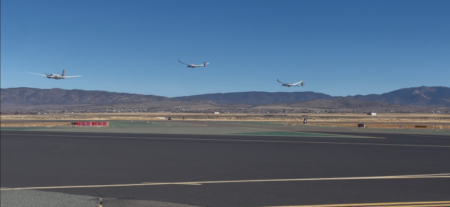Airspeeder has conducted the first test flights of a full-scale version of its remotely-piloted Alauda Mk3 electric flying racing car.
The test flights were conducted in South Australia under the observation of Australia’s Civil Aviation Safety Authority said Airspeeder.
The Airspeeder Alauda Mk3 and race series were first announced in April 2020, with the races initially planned to take place the same year. Development of the eVTOL aircraft started in 2017.
The success of these test flights means that the company can progress towards holding three races this year which will use uncrewed Mk3s at different locations around the world. These races will be called the EXA Series and serve as a trial for piloted races Airspeeder now plans to hold next year.
Alauda’s technical headquarters is in Adelaide, South Australia, where the Alauda Airspeeder Mk3 has now entered production, with 10 in build ready for the teams that will take place in the EXA Series races.
Matthew Pearson, founder of Airspeeder and Alauda Aeronautics said, “Nothing drives innovation like racing. The world is ready for advanced air mobility and we are proud to make history by introducing the world’s first racing series for flying electric cars.
“These historic first flights are just the start and we are all excited to begin a momentous new chapter in motorpsort’s rich legacy.
During EXA races, pilots will remotely control their Alauda aircraft across “sky tracks”. The Mk3 are equipped with LiDAR and radar systems to ensure “safe racing”.
Pilots will sit in a simulator environment that mimics the dynamics and ergonomics of the Mk3 cockpit environment. Inside the Mk3 during the races will be dummies fitted with sensors, which Airspeeder is calling physical tele-robotic avatars named The Aviators, to represent human pilots.
Airspeeder plans to use data and information from these dummies to analyze the effects of high speed racing, rapid turning, acceleration and deceleration on pilots.
The Mk3 weighs 130kg and can accelerate from 0-62mph takes 2.8 seconds and climb to an altitude of 500m, said Airspeeder.
Related stories
AAIB slams Airspeeder for ‘poor design and build quality’ after 2019 demonstrator crash
Latest Airspeeder ‘flying electric racing car’ design revealed




